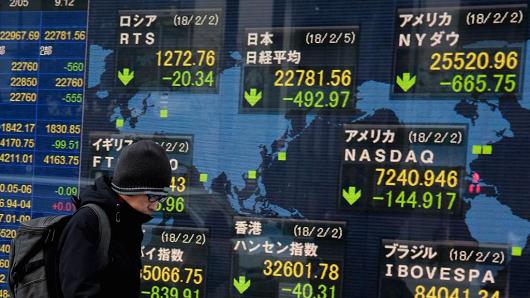
Asian stocks declined on Friday, with steel producers and automaker names recording steep drops. The fall in regional markets tracked sharp losses on Wall Street following a tariff announcement from U.S. President Donald Trump.
Trump said on Thursday that the U.S. will impose tariffs of 25 percent for steel and 10 percent for aluminum. The tariffs will be implemented broadly, without targeting specific countries.
Markets stateside fell on the news as investors worried about retaliatory actions from U.S. trade partners that could potentially result in a trade war. In addition, tariffs are also seen as inflationary as they could mean higher prices for consumers.
Japan’s trade minister responded to the news on Friday, saying that Japanese steel exports were not a threat to U.S. national security, Reuters reported, citing local wire service Jiji.

Canada, the largest source of U.S. steel imports, indicated it would respond to U.S. tariffs with its own measures. The European Union, meanwhile, said it would “react firmly and commensurately” to defend its interests.
“Given uncertainty whether the move presages a path of increased tariff application for the U.S., we expect risk sentiment to remain fragile for now,” Chang Wei Liang, a strategist at Mizuho Bank, said in a note.
Steel, automaker stocks hurt
In Tokyo, the benchmark Nikkei 225 fell 479.33 points, or 2.18 percent, as the yen firmed, with steel stocks trading sharply lower. JFE Holdings declined 2.86 percent, Nisshin Steel lost 2.34 percent and Kobe Steel lost 2.68 percent.
Automakers, which make use of steel and aluminum products, also tracked losses seen stateside. Honda Motor and Toyota Motor sank 3.29 percent and 2.05 percent, respectively.
Other sectors, including technology, were also firmly lower. Sony lost 1.11 percent and SoftBank Group tumbled 3.14 percent.
Elsewhere, the Kospi declined 0.86 percent, with technology and manufacturing stocks mostly trading lower. Index heavyweight Samsung Electronics fell 1.7 percent.
Meanwhile, steelmaker Posco and Hyundai Steel dropped 3.04 percent and 2.61 percent, respectively. Automakers were also firmly in negative territory, with Hyundai Motor down 3.1 percent.
Down Under, the S&P/ASX 200 edged lost 0.67 percent, with gold producers the only sector to trade in the green. Gold stocks rose 1.3 percent. Mining majors were lower, with Rio Tinto sinking 1.14 percent. Meanwhile, Bluescope Steel rose 0.93 percent.
Greater China markets followed regional markets lower, with Hong Kong’s Hang Seng Index falling 1.53 percent. Large cap names were downbeat: China Construction Bank was down 2.31 percent, Tencent lost 2.01 percent and insurer AIA sank 2.06 percent.
Mainland markets saw more moderate declines than their regional peers. The Shanghai composite slipped 0.32 percent and the Shenzhen composite edged lower by 0.44 percent.
Steel and aluminum stocks listed on the mainland recorded steep losses as markets reacted to news about U.S. tariffs, with Baoshan Steel falling 3.3 percent. Shares of Alumimium Corporation of China, or Chalco, fell 1.28 percent.
U.S. markets slid in the last session on the back of Trump’s announcement, with stock indexes recording losses of more than 1 percent. The Dow Jones industrial average closed 420.22 points to close at 24,608.98, despite advancing more than 150 points earlier in the session.
Markets also took note of Federal Reserve Chairman Jerome Powell’s Thursday testimony before the Senate Finance Committee. Powell said that he did not currently see any signs of overheating in the U.S. economy.
On Friday, U.S. stock index futures traded mixed during Asia afternoon trade, with Dow futures off by 81 points following the sell-off overnight.
In currencies, the dollar index, which tracks the greenback against its rivals, edged lower to trade at 90.160 by 12:39 p.m. HK/SIN, flat from Thursday’s close of 90.242 and off a high of 90.932 earlier in the overnight session.
Against the safe haven yen, the dollar extended losses to trade at 106.12 after sliding in the previous session. That compared with levels around the 107 handle hit earlier in the week.
Retaliatory responses from other countries to U.S. tariffs “would be a mild drag to global economic activity and support the dollar, particularly against cyclical-sensitive currencies,” Elias Haddad, a currency strategist at Commonwealth Bank of Australia, said in a note.

